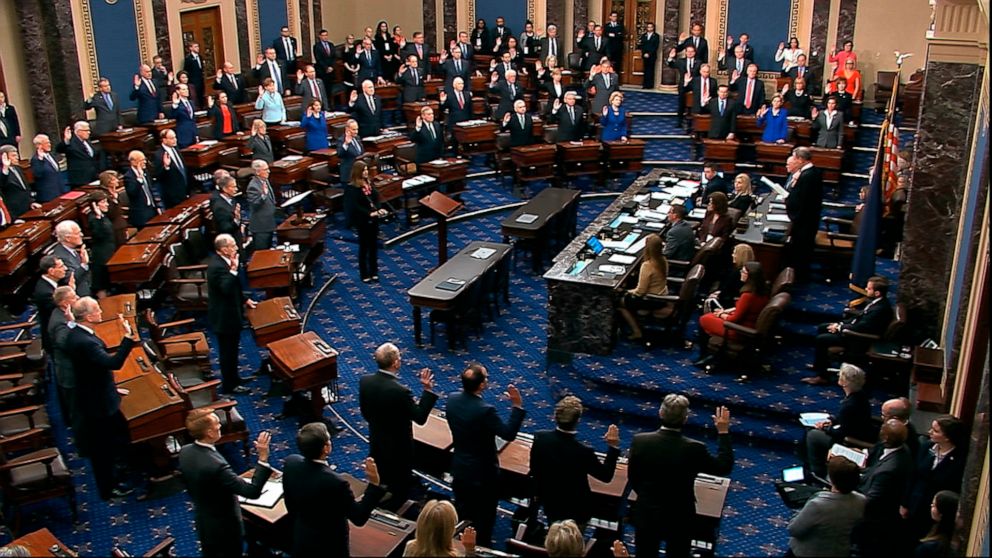“A nation which has forgotten the quality of courage which in the past has been brought to public life is not as likely to insist upon or reward that quality in its chosen leaders today…” – Senator John F. Kennedy, Profiles in Courage

In the first chapter of Kennedy’s book he writes, “… a member of the [President’s] Cabinet had recorded in his diary:
“While I am reluctant to believe in the total depravity of the Senate, I place but little dependence on the honesty and truthfulness of a large portion of the Senators. A majority of them are small lights, mentally weak, and wholly unfit to be Senators. Some are vulgar demagogues … some are men of wealth who have purchases their position … [some are] men of narrow intellect, limited comprehension and low partisan prejudice.”
With these words, this unknown Cabinet member characterized the vast majority of today’s Senate Republicans (and, I’m sure, some Democrats, as well.)
During the 3rd day of a former president’s impeachment trial in the Senate, I revisited Kennedy’s book looking, once again for hope.
While Massachusetts Senator Daniel Webster is revered as one of the greatest orators in the history of the Senate, history has recorded that his moral sense could be compromised on several occasions when it served his purposes. However, there was one issue that Webster was absolutely immovable on: Slavery.
“From my earliest youth,” Webster wrote to a friend, “I have regarded slavery as a great moral and political evil. … You need not fear that I shall vote for any compromise or do anything inconsistent with the past.”
But Webster faced a serious dilemma. The South was moving closer and closer to secession, and Webster feared that civil violence “would only rivet the chains of slavery the more strongly.”
In speaking with Southern leaders, Webster wrote that considering “the condition of the country, I thought the inevitable consequences of leaving the existing controversies unadjusted would be Civil War.”
“I am nearly broken down with labor and anxiety,” Webster wrote in a letter to his son. “I know not how to meet the present emergency, or with what weapons to beat down the Northern and Southern follies now raging in equal extremes… I have poor spirits and little courage,” he concluded.
After much deliberation, Webster determined that only the Clay Compromise — whose purpose was to maintain a balance between free and slave states and to satisfy both pro-slavery and anti-slavery forces; slave states would remain while new states would be anti-slavery — would forestall secession and civil war. While the Compromise succeeded in the short run, it did not prevent the civil war to come. However, in that moment in time, Webster prepared “to make an honest truth-telling speech and a Union speech and discharge a clear conscience.”
On March 7, 1850, Webster stood to give what would become known as The Seventh of March Speech; a speech where Webster would risk his career and his reputation for the sake of the union.
“Mr. President, I wish to speak today, not as a Massachusetts man, nor as a Northern man, but as an American, and a member of the Senate of the United States.…I speak for the preservation of the Union. Hear me for my cause.”
“The Massachusetts statesman then spoke for three and a half hours,” The United States Senate website writes, “a relatively brief performance for one known to have given an after dinner speech lasting five hours.
“Webster contended that it was pointless to argue about the continuation of slavery where it already existed—it was not going away—or to worry about extending slavery into the arid lands of the southwest, where plantation agriculture stood no chance of flourishing. Asserting that slave holders were entitled to the protection of their property, he urged strengthening of fugitive slave statutes.
“Webster’s address quickly appeared in newspapers throughout the nation. Nearly everywhere but in his native New England, Webster won high praise for moral courage. It was said that his speech slammed into New England with the force of a hurricane.”
As a result of the blow-back from his base of supporters, Daniel Webster resigned his seat in the Senate. Webster felt that loyalty to the Union was more important than his strongly held beliefs.
I wish to God today’s Senators would read the Webster chapter in Kennedy’s book before taking a final vote on impeachment and understand the importance of putting loyalty to the United States ahead of loyalty to a president who incited an extremist base of supporters to attack a symbol of American deliberation and democracy.
Comments
Leave a Comment










Absolutely, “understand the importance of putting loyalty to the United States ahead of loyalty to a president…”